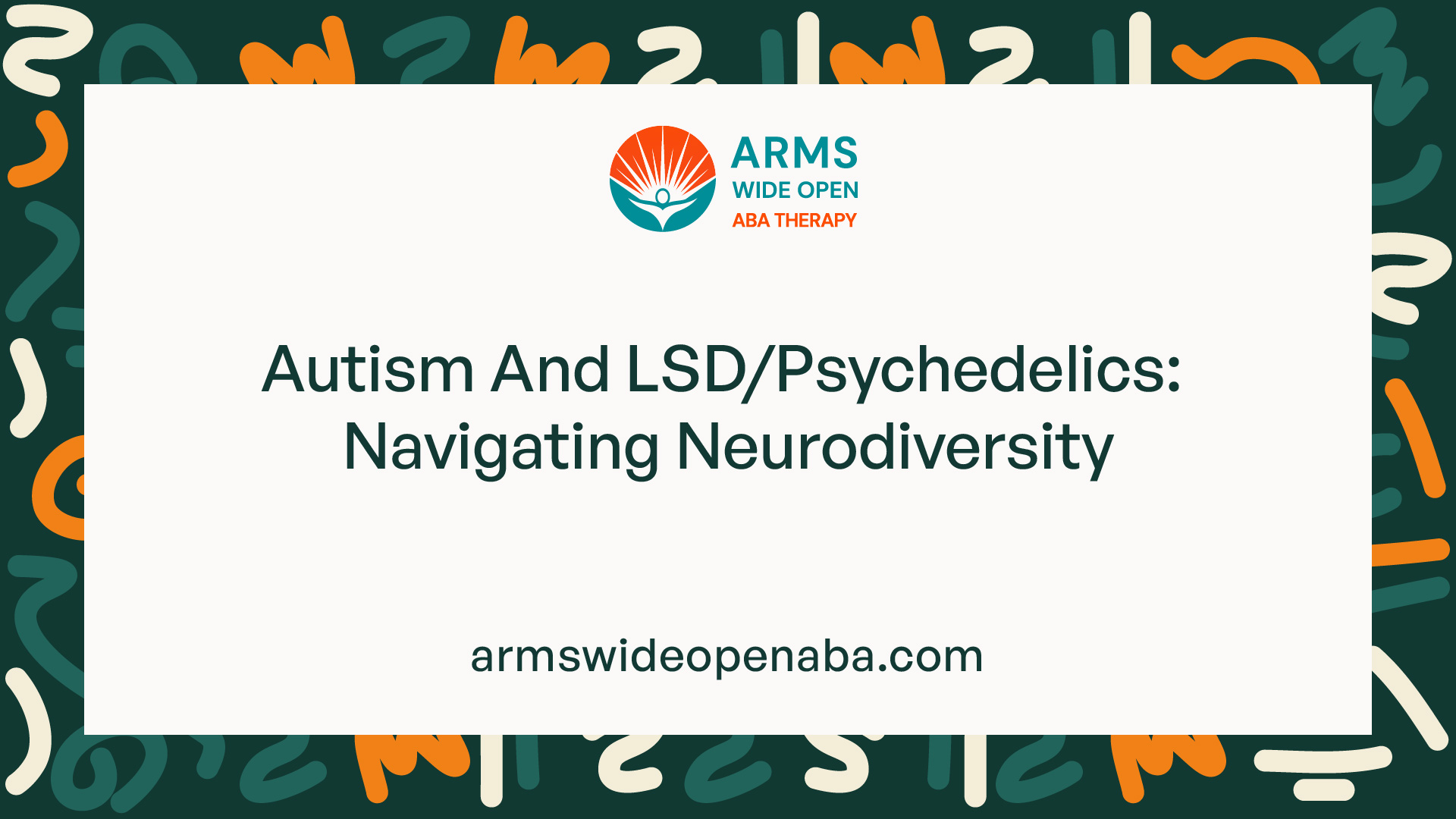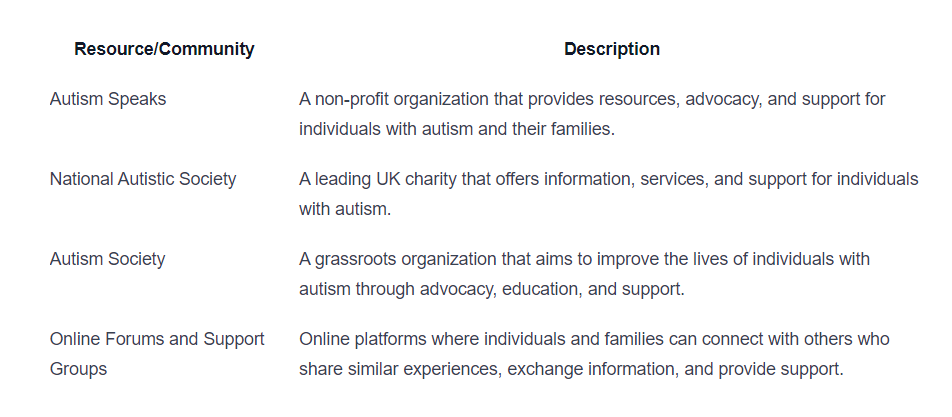Autism And LSD/Psychedelics: Navigating Neurodiversity
Uncover the connection between autism and LSD/psychedelics in neurodiversity. Explore potential benefits, risks, and supportive resources.

Exploring Autism and Neurodiversity
To understand the connection between autism and LSD/psychedelics in the context of neurodiversity, it is important to first explore the concepts of autism spectrum disorder (ASD) and neurodiversity itself.

Understanding Autism Spectrum Disorder
Autism Spectrum Disorder (ASD) is a developmental disorder characterized by challenges in social interaction, communication, and repetitive behaviors. It is a spectrum disorder, meaning that individuals with ASD can have a wide range of abilities and symptoms. While the exact causes of ASD are still being studied, it is believed to be influenced by a combination of genetic and environmental factors.
Different individuals with autism may experience varying degrees of difficulty in areas such as social communication, sensory processing, and executive functioning. Some may require additional support, while others may thrive in certain environments or excel in specific areas of interest. It is important to approach autism with an understanding that it is a unique neurological variation, rather than a deficit or disorder that needs to be "fixed."
Embracing Neurodiversity
Neurodiversity is a concept that recognizes and celebrates the diversity of human neurological variations. It promotes the understanding that neurological differences, such as those found in individuals with ASD, are natural variations of the human brain rather than abnormalities. Neurodiversity emphasizes the value of different ways of thinking, perceiving, and experiencing the world.
Embracing neurodiversity means moving away from the notion of trying to "cure" or "normalize" individuals with autism, and instead focusing on acceptance, accommodation, and support. It involves creating inclusive environments that value the strengths and unique perspectives of individuals with autism, while also addressing their specific needs and challenges.
By embracing neurodiversity, society can foster a more inclusive and accepting culture that values the contributions and potential of all individuals, regardless of their neurological differences.
Understanding autism spectrum disorder and embracing neurodiversity are important foundations for exploring the connection between autism and LSD/psychedelics in the context of neurodiversity. By recognizing and valuing the diverse experiences and perspectives of individuals with autism, we can better navigate the potential benefits and risks associated with the use of LSD/psychedelics in this population.
The History of LSD and Psychedelics
To truly understand the connection between autism and LSD/psychedelics in the context of neurodiversity, it is important to explore the history of these substances. This section will delve into the origins and cultural significance of LSD and psychedelics, as well as their modern research and applications.
Origins and Cultural Significance
LSD, also known as lysergic acid diethylamide, was first synthesized by Swiss chemist Albert Hofmann in 1938. However, it wasn't until 1943 when Hofmann accidentally discovered its psychedelic properties during a self-experimentation. This accidental discovery marked the beginning of a new era in psychedelic research.
In the 1950s and 1960s, LSD gained popularity as a tool for psychotherapy and self-exploration. It was believed that LSD had the potential to facilitate personal growth, enhance creativity, and provide a profound spiritual experience. The counterculture movement of the 1960s further contributed to the cultural significance of LSD and psychedelics, as they were associated with rebellion, anti-establishment sentiments, and the exploration of altered states of consciousness.
Modern Research and Applications
In the mid-20th century, research into LSD and psychedelics came to a halt due to various factors, including regulatory restrictions and the association of these substances with recreational use. However, in recent years, there has been a resurgence of interest in studying their potential therapeutic applications.
Modern research on psychedelics, including LSD, has shown promising results in the treatment of various mental health conditions, such as depression, anxiety, and post-traumatic stress disorder (PTSD). Studies have also explored their potential in enhancing creativity, reducing addictive behaviors, and facilitating spiritual experiences.
One notable area of research is the use of psychedelics in the context of neurodiversity, including autism spectrum disorder (ASD). While the research is still in its early stages, there is growing interest in understanding how psychedelics may impact individuals with autism and their unique perceptual experiences.
Understanding the historical background of LSD and psychedelics helps provide context for their current applications and ongoing research. By building upon this knowledge, researchers and advocates can further explore the potential benefits and risks of these substances in the context of autism and neurodiversity.
Intersection of Autism and Psychedelics
The intersection between autism and psychedelics has garnered significant attention in recent years. While research is still in its early stages, studies have been conducted to explore the potential benefits and risks associated with using psychedelics as a tool for understanding and supporting individuals on the autism spectrum.
Current Studies and Findings
Researchers have begun to investigate the effects of psychedelics on individuals with autism, aiming to understand how these substances may impact their perception, cognition, and overall well-being. Although the studies are limited in number and sample size, they provide valuable insights into this emerging field.
One notable study conducted in 2019 by researchers at Imperial College London explored the effects of psilocybin (the active compound in magic mushrooms) on individuals with autism. The study found that psilocybin administration resulted in reduced social anxiety and increased sociability among the participants. Furthermore, the researchers observed improvements in emotional and sensory experiences, as well as enhanced introspection and self-reflection.
Another study published in 2020, conducted by researchers at the University of California, San Francisco, examined the effects of MDMA (commonly known as ecstasy or Molly) on social behavior in adults with autism. The preliminary findings suggested that MDMA-assisted therapy may enhance social functioning and reduce social anxiety in individuals with autism.
While these studies offer promising preliminary results, it is important to note that further research is necessary to fully understand the potential benefits and risks of psychedelics for individuals on the autism spectrum.
Potential Benefits and Risks
The potential benefits of psychedelics for individuals with autism extend beyond the immediate effects observed in studies. Some researchers and advocates believe that these substances may facilitate a deeper understanding of oneself and others, potentially leading to personal growth and increased empathy.
However, it is important to approach the use of psychedelics with caution. The effects of these substances can vary greatly from person to person, and the experiences may be intense and overwhelming for some individuals. It is crucial to prioritize safety and ensure that any psychedelic use is conducted in a controlled and supervised environment.
Furthermore, the legal and ethical considerations surrounding the use of psychedelics for individuals with autism are complex. Current regulations restrict the legal use of these substances, and the potential risks associated with unsupervised use must be carefully considered.
As research in this field continues to evolve, it is essential to approach the topic with an open mind while also acknowledging the need for rigorous scientific investigation and adherence to ethical guidelines.
By exploring the intersection of autism and psychedelics, researchers hope to shed light on new therapeutic possibilities and contribute to a better understanding of neurodiversity. The ongoing studies and findings pave the way for continued exploration and dialogue surrounding the potential benefits and risks associated with psychedelics in the context of autism.
Perspectives on Neurodiversity
When exploring the intersection of autism and psychedelics, it is important to consider different perspectives on neurodiversity. This section delves into the advocacy and acceptance of neurodiversity as well as ethical considerations and future directions.
Advocacy and Acceptance
Advocacy for neurodiversity aims to promote the acceptance and understanding of individuals with autism and other neurodevelopmental differences. It emphasizes the importance of recognizing and valuing the diverse strengths and abilities that neurodiverse individuals bring to society.
By embracing neurodiversity, society can move away from a deficit-based model of viewing autism and instead focus on creating inclusive environments that support the unique needs and strengths of individuals on the autism spectrum.
Advocacy efforts often involve raising awareness, promoting equal opportunities, and advocating for policies that support the rights and well-being of neurodiverse individuals. Organizations and communities dedicated to autism advocacy work towards reducing stigma and discrimination and fostering a more inclusive society.
Ethical Considerations and Future Directions
As research on the potential benefits of psychedelics for individuals with autism continues to evolve, ethical considerations play a crucial role in guiding future directions. It is essential to ensure that any potential use of psychedelics is conducted responsibly and ethically, with the well-being and safety of individuals with autism as the top priority.
Ethical considerations involve factors such as informed consent, participant safety, and adherence to research protocols. Researchers and practitioners must follow strict ethical guidelines and obtain appropriate approvals to conduct studies involving psychedelics and individuals with autism.
Future directions in this field include further research to better understand the impact of psychedelics on individuals with autism and the potential therapeutic benefits they may provide. Ongoing studies aim to explore the efficacy, safety, and long-term effects of psychedelics in this specific population.
Additionally, future directions also involve addressing the broader societal implications of using psychedelics as a potential treatment for individuals with autism. This includes the development of guidelines, regulations, and policies to ensure responsible and ethical use, as well as considering accessibility and affordability of any potential treatments.
By considering the perspectives of advocacy and acceptance, and taking into account ethical considerations and future directions, society can approach the intersection of autism and psychedelics with care and responsibility. This approach helps to foster a more inclusive and supportive environment for individuals with autism, while also paving the way for further research and advancements in the field of neurodiversity.
Personal Stories and Experiences
Exploring the connection between autism and LSD/psychedelics opens up a fascinating realm of personal stories and experiences. Through these narratives, individuals with autism who have had psychedelic experiences provide unique insights into the impact on their perception and understanding.
Individuals with Autism and Psychedelic Experiences
Several individuals with autism have reported profound experiences after using psychedelics such as LSD. These personal accounts shed light on the potential effects of psychedelics on the autistic mind.
While it's important to note that each person's experience is subjective and can vary, some individuals with autism have described the following effects after using psychedelics:
Effects Reported by Individuals with Autism
Enhanced sensory perception
Heightened self-awareness
Deep introspection
Altered perception of time
Increased empathy
Expanded creativity
These experiences have led some individuals to gain a new perspective on their own neurodivergent traits and a better understanding of their place within the broader neurodiverse community.
Impact on Perception and Understanding
The impact of psychedelic experiences on perception and understanding is a notable aspect shared by many individuals with autism. Some individuals have reported that psychedelics allowed them to perceive the world in a different way, offering new insights and perspectives.
Psychedelics have been described as potentially facilitating a shift in perception that allows individuals with autism to view themselves and the world around them from a fresh standpoint. This altered perception may promote a deeper understanding and acceptance of their own neurodivergent experiences.
Moreover, psychedelic experiences have been associated with enhanced empathy and the ability to connect with others on a deeper level. For individuals with autism, this increased empathy can provide a bridge for better communication and social interactions.
It is important to approach personal stories and experiences with an understanding that these accounts may not apply universally. Each individual's response to psychedelics can vary significantly, and factors such as dosage, set, and setting play a crucial role in shaping the overall experience.
By exploring personal stories and experiences, we can gain valuable insights into the potential impact of psychedelics on individuals with autism. However, it is essential to consider these stories within the broader context of ongoing research and the unique characteristics and needs of individuals on the autism spectrum.
Navigating Neurodiversity
When it comes to navigating neurodiversity, individuals and families impacted by autism spectrum disorder (ASD) can benefit from various supportive resources and communities. Additionally, continuing dialogue and education play a crucial role in raising awareness and promoting understanding. Let's explore these aspects in more detail.
Supportive Resources and Communities
Finding supportive resources and communities can provide invaluable assistance and a sense of belonging for individuals and families affected by autism. These resources offer information, guidance, and emotional support, helping individuals navigate the unique challenges and celebrate the strengths associated with autism.
Here are some examples of supportive resources and communities for neurodiverse individuals and their families:

These resources and communities offer a wealth of information, guidance, and connections that can make a positive difference in the lives of those navigating neurodiversity.
Continuing Dialogue and Education
Continuing dialogue and education are vital components in promoting understanding and acceptance of neurodiversity. By fostering open conversations and sharing knowledge, society can work towards creating a more inclusive and supportive environment.
Key aspects of continuing dialogue and education include:
- Awareness Campaigns: Public awareness campaigns are essential for dispelling myths, reducing stigma, and fostering acceptance of individuals with autism. These campaigns help educate the general public about autism, its characteristics, and the importance of inclusion.
- Training for Professionals: Providing training and education to professionals in fields such as healthcare, education, and social services can enhance their understanding of autism and equip them with the tools to support individuals with autism effectively.
- Community Events and Workshops: Organizing community events and workshops focused on neurodiversity can bring people together, encourage dialogue, and provide opportunities for learning and sharing experiences.
- School Programs and Inclusion: Implementing inclusive education programs that support the diverse needs of students with autism can create an environment where all individuals can thrive academically, socially, and emotionally.
By fostering ongoing dialogue and education, we can break down barriers, challenge stereotypes, and create a society that embraces and celebrates the unique strengths and perspectives of all individuals, regardless of their neurodiversity.
Navigating neurodiversity requires access to supportive resources and communities, as well as a commitment to continuing dialogue and education. By working together, we can build a more inclusive and understanding society that values the contributions and experiences of individuals with autism and other neurodiverse conditions.
Sources
https://www.totalcareaba.com/autism/autism-and-lsd-psychedelics
https://www.abtaba.com/blog/autism-and-lsd-psychedelics
https://www.thetransmitter.org/spectrum/tripping-over-the-potential-of-psychedelics-for-autism/
Similar articles
We’re here to help you

Our team is here to assist you in this process. Contact us for any assistance.
it’s easy to apply
We Accept Most Insurances
Our in-network insurance partnerships make ABA therapy more accessible to families throughout our service areas.







Our Insurance Process
We'll request your insurance details to help us verify your plan's coverage for ABA therapy. Once we've received this information, we'll walk you through your benefits, including copayments, deductibles and out-of-pocket maximums, so you know what to expect in advance.
Our team will then handle the preauthorization and all the necessary paperwork.
.svg)





















.jpeg)


































.jpeg)




.jpeg)







.jpeg)











.jpeg)
















